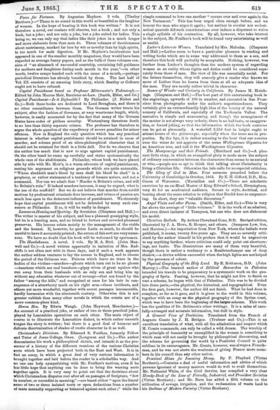Capital Punishment based on - Professor Mittermaier's Todeastrafe. — Edited by John
Macrae Moir, Barrister-at-Law. (Smith, Elder, and Co.) Capital Punishment—Is it Defensible? By Philander. (J. Nisbet and Op.)—Both these books are dedicated to Lord Brougham, and there is no other resemblance between them. The German writer treats his subject, after the fashion of Germans, at very wearisome length, which, however, is easily accounted for by the fact that many of the German States have nodes of pitiless severity. Wurtemburg threatens death to no less than thirty separate crimes. The professor has therefore to argue the whole question of the expediency of severe penalties for minor offences. Now in England the only question which has any practical interest is whether capital punishment should be retained in cases of murder, and solemn proof of an ultra-philosophical character that it should not be retained for theft is a little dull. Nor do wo observe that the author has much that is new to urge against capital punishment. On the other hand he sums up carefully and states systematically the whole case of the abolitionists. Philander, whose book we have placed side by side with Mr. Moir's, is a warm advocate of capital punishment, resting his argument on religions grounds which are quite untenable. "Whose sheddeth man's blood by man shall his blood be shed" is a prophecy, or rather statement of a tendency of human nature, and not a command. Nor can we admit that " Murder is Britain's crime, and will bs Britain's ruin." If indeed murders increase, it may be argued, what is the use of the scaffold? But we do not believe that murder from sordid motives by professional criminals does increase, and crimes of passion are much lees open to the deterrent influence of punishmeht. We sincerely hope that capital punishment will not be defended by many such rea- senors as Philander. If so, it will be really in danger.






























 Previous page
Previous page